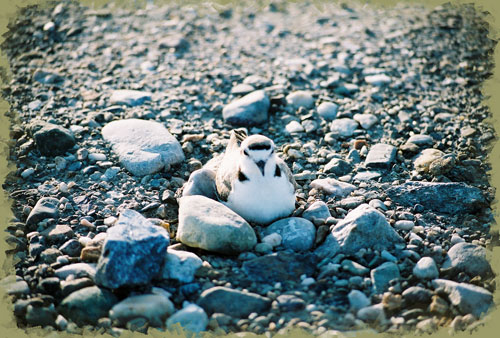|
About
Courses
Research
Avian Ecology Lab
Undergraduate Research
Contact |
B.S., Illinois State
University
M.S., Illinois State University
Ph.D., Kansas State University
Research Interests
My research focuses on
the behavioral and evolutionary bases of ecological
patterns in shorebirds. I utilize birds to address research
questions because their behaviors and fitness components
can be readily observed and measured. My research
objectives are divided into three main areas:
foraging behavior and ecology, shorebird survival and
productivity, and the consequences of land use and
management on avian populations.

Currently, my research is
examining foraging behavior, diet, nesting success and
nest-site selection of shorebirds utilizing the Great
Salt Lake. The Great Salt Lake is one of the most
important breeding and staging areas for shorebirds, yet
critical information is lacking on the effects of land
use and management on breeding productivity.
Current research projects include:
-
FEEDING ECOLOGY AND DIET OF AMERICAN AVOCET AND
BLACK-NECKED STILTS AT GREAT SALT LAKE, UTAH.
-
FACTORS AFFECTING NESTING SUCCESS OF COEXISTING
SHOREBIRDS
-
Nest Site Selection and Nesting Success of Snowy Plover
Teaching
My teaching objectives
are to: 1) provide students with a strong background and
knowledge of the subject matter, and 2) provide
opportunities for students to practice and develop
critical-thinking and problem-solving skills, both
within a structured classroom environment and through
research experiences. The courses I regularly teach at
Weber State University include the following:
- Zool 1120 -
Principles of Zoology II
- Zool 3450 -
Ecology
- Zool 3470 -
Zoogeography
- Zool 4470 -
Wildlife Management and Ecology
- Zool 4670 -
Ornithology
- Zool 4900D -
Field Ornithology
Undergraduate Research Opportunities
An objective of my
teaching philosophy is to involve students in
undergraduate research opportunities. Students that
participate in research or work with me to develop their
own projects, acquire very important skills and
experiences. They learn how the scientific method is
applied, they learn critical thinking skills, and they
gain a better understanding of how data is collected,
managed and analyzed. This mentor-student relationship
facilitates student-centered instruction and creates a
strong relationship that is often maintained after the
research is completed. Most importantly, participation
in undergraduate research allows students to become
involved in the process of scientific investigation
which stimulates their desire for learning. The value of
an undergraduate research experience is recognized by
potential employers, as well as graduate and
professional schools.
Students interested in
gaining research experience are encouraged to meet with
me to discuss expectations and requirements.
There are many
opportunities in the
Department of Zoology
for students to gain research experience. If you are interested in
making the most of your education then consult our Departmental
website or talk with a faculty member.
|

